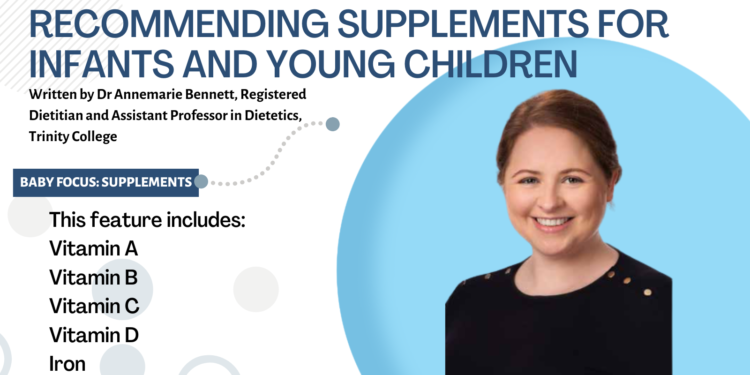Vitamin A
Vitamin A is particularly important for the development and maintenance of eyesight and plays a role in growth and the development of healthy body tissues. Vitamin A deficiency is rare in high-income countries, but when it does occur, it can result in night blindness and xeropthalmia (dryness of the conjunctiva and cornea of the eye).
The main dietary sources of vitamin A are of animal origin, and include milk, cheese, eggs, fortified spreads, yoghurt, meat, and meat products. Non-animal sources of vitamin A include vegetables such as carrots and sweet potato. Through an appropriately varied diet alone, infants and young children should achieve recommended intakes of vitamin A. Supplementation with vitamin A among infants and young children is not recommended unless advised by a medical doctor.

Written by Dr Annemarie Bennett, Registered Dietitian and Assistant Professor in Dietetics, Trinity College
Vitamin B
There are several different kinds of B vitamins, and they have many different and important functions in the body, to include facilitating the release of energy from food, protecting the nervous system, and maintaining healthy blood cells. Deficiencies in B vitamins are rare among children in high-income countries. A key reason for this is that B vitamins are found in a wide range of foods, to include vegetables, milk, cheese, meat, fish, poultry, eggs, and fortified cereals. Vitamin B requirements should be met through an appropriately varied diet alone, with supplementation only advised when recommended by a medical doctor.
Vitamin C
Vitamin C is important for maintaining the health of skin, gums, blood vessels, bones, and cartilage, and for supporting immunity and healing. Poor vitamin C intakes over several months can lead to an inflammation of the gums – a condition called scurvy, which is easily treatable with the reintroduction of vitamin C. However, vitamin C is found in a wide variety of fresh fruits and vegetables, and especially in citrus fruits, such as oranges and limes, making deficiency uncommon. Excessive vitamin C intakes can lead to stomach pains and diarrhoea, and as such, vitamin C supplements among infants and young children are not recommended unless specifically advised by a medical doctor.
Vitamin D
Vitamin D helps our body to absorb calcium and is therefore essential for musculoskeletal and dental health. It is especially important during periods of rapid bone development, such as infancy and early childhood. Research has also highlighted the potential role of vitamin D in long-term health outcomes, such as reducing the risk of heart disease, diabetes, and the Metabolic Syndrome, making the prevention of deficiency a public health priority.
Vitamin D is made in our skin when it is exposed to UV light from the sun’s rays. However, prolonged direct exposure to sunlight is not recommended for any person, and especially infants and young children, given the impact this has on shortand long- term skin cancer risk. Vitamin D can be consumed in food, but natural food sources of vitamin D that are suitable for infants (once weaning commences around 6 months of age) and young children are relatively few, e.g., oily fish and eggs. Foods fortified with vitamin D have become more commonplace and are important contributors to dietary intakes of vitamin D, e.g., cereals, yogurts, cheese, cow milk, and infant and growing up milks. Fortified infant milks have become notable sources of vitamin D for infants over the past decade, and even more so in recent years, as EU legislation was amended to permit higher amounts of vitamin D per 100kcal milk formula. These advances in food sources of vitamin D increase the likelihood of meeting vitamin D recommendations, especially among infants consuming milk formula and young children consuming fortified milk.
For infants that are exclusively breastfed or are consuming relatively small amounts of milk formula, however, it is unlikely that recommendations for vitamin D will be met. To help overcome this, the HSE recommends a daily supplement of 5 micrograms (mcg) vitamin D from birth to 12 months of age for infants that are:
• Breastfed; and/or,
• Taking less than 300mls (10 ounces) infant formula per day.
For all young children aged 1-4 years, the HSE recommends giving a supplement of 5 mcg vitamin D everyday throughout winter, typically from Halloween to St Patrick’s Day. This recommendation was made because skin cannot synthesise vitamin D during the winter months in Ireland, when sunlight is weaker and limited. With sunlight contributing little or nothing to vitamin D stores during this time, it is difficult to meet vitamin D recommendations through diet alone and a vitamin D supplement is needed. However, from midMarch to October, dietary sources of vitamin D with responsible exposure to sunlight typically ensure requirements are met. When supplements are recommended, liquid supplements containing only vitamin D are advised for infants and young children. Chewable or tablet-type supplements pose a choking risk and should be avoided.
Iron
Iron is essential for growth and the development of healthy blood cells. Infants are born with a 6-month store of iron that they accumulate from their mother over the course of pregnancy. From about 6 months of age, these stores have run low, and infants and young children need to consume sufficient iron from their diet.
Food rich in iron and suitable for children aged 6 months and upwards includes beef, lamb, and pork. Other foods that contain iron include eggs, fortified cereals, and leafy greens, although iron from these foods is less easily absorbed. Vitamin C increases the amount of iron absorbed from food, so consuming fresh fruits and vegetables with iron-containing foods will optimise absorption. Insufficient iron in the diet can lead to iron-deficiency anaemia, which is characterised by tiredness, pallor, poor appetite, and difficulty fighting infection. If there are concerns about iron deficiency, it is important to recommend a visit to the GP, who will investigate accordingly. Given the risks of iron overload, iron supplementation is only advised for infants and young children when specifically recommended by a medical doctor.









